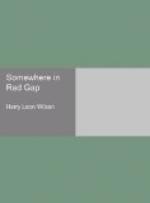“What’s this about his brother-in-law?” I asked.
“Oh, I dunno; some silly game he tries to come the roots over folks with. Say, he’s a regular old murderer, and not an honest hair in his head! Look at the old cheat letting on to be a good steady worker because he thinks the boss is in the house there, keeping an eye on him. Ain’t it downright disgusting!”
Uncle Abner said this as one supremely conscious of his own virtue. He himself was descending to no foul pretense.
“A murderer, is he?”
I opened my cigarette case to the man of probity. He took two, crumpled the tobacco from the papers and stuffed it into his calabash pipe.
“Sure is he a murderer! A tough one, too.”
The speaker moved round a corner of the barn and relaxed to a sitting posture on the platform of the pump. It brought him into the sun; but it also brought him where he could see far down the road upon which his returning employer would eventually appear. His eyes ever haunted the far vistas of that road; otherwise he remained blissfully static.
It should perhaps be frankly admitted that Uncle Abner is not the blacksmith of song and story and lithographed art treasure, suitable for framing. That I have never beheld this traditional smith—the rugged, upstanding tower of brawn with muscles like iron bands—is beside the point. I have not looked upon all the blacksmiths in the world, and he may exist. But Uncle Abner can’t pose for him. He weighs a hundred and twenty pounds without his hammer, is lean to scrawniness, and his arms are those of the boys you see at the track meet of Lincoln Grammar School Number Seven. The mutilated derby hat he now wore, a hat that had been weathered from plum colour to a poisonous green—a shred of peacock feather stuck in the band—lent his face no dignity whatever.
In truth, his was not an easy face to lend dignity to. It would still look foolish, no matter what was lent it. He has a smug fringe of white curls about the back and sides of his head, the beard of a prophet, and the ready speech of a town bore. The blacksmith we read of can look the whole world in the face, fears not any man, and would far rather do honest smithing any day in the week—except Sunday—than live the life of sinful ease that Uncle Abner was leading for the moment.
Uncle Abner may have feared no man; but he feared a woman. It was easy to see this as he chatted the golden hours away to me. His pale eyes seldom left the road where it came over a distant hill. When the woman did arrive—Oh, surely the merry clang of the hammer on the anvil would be heard in Abner’s shop, where he led a dog’s life. But, for a time at least—
“So he’s one of these tough murderers, is he?”




